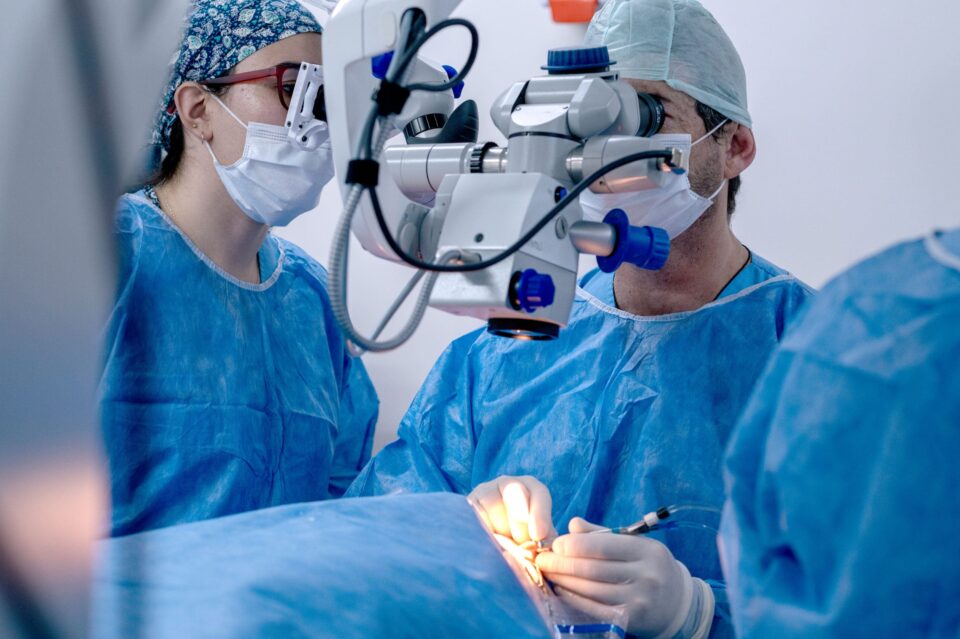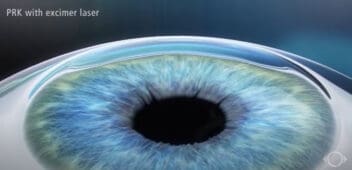
Procedures
PRK Surgery (Photorefractive Keratectomy)
Home / Procedures /
PRK Laser Eye Surgery
Photorefractive Keratectomy, more commonly called PRK, is a laser vision correction procedure. PRK is often a good solution for people with thinner than normal corneas—but your surgeon will be able to determine which procedure is best for your individual needs.
Condition Treated
About Nearsightedness
Myopia, also known as nearsightedness, is a common type of refractive error where near objects appear clearly, but far objects appear blurry. This happens when the eyeball is too long or the cornea has too much curvature, causing light to focus in front of the retina instead of directly on it.
About Astigmatism
Astigmatism causes your vision to be blurred at both near and far distances. It occurs when your cornea is shaped more like a football than a basketball.
Key features of astigmatism include:
- Blurred or Distorted Vision: Individuals with astigmatism often experience blurred or distorted vision at both near and far distances.
- Eye Strain and Discomfort: Astigmatism can lead to eye strain, headaches, and discomfort, especially after prolonged periods of reading or computer use.
- Difficulty with Night Vision: Some people with astigmatism may notice challenges with night vision, including glare and halos around lights.
- Combination with Other Refractive Errors: Astigmatism can occur on its own or in combination with nearsightedness or farsightedness.
Farsightedness
The medical term for farsightedness is hyperopia. Farsightedness is a common refractive error in the eye that affects the ability to see close-up objects. In farsighted individuals, light entering the eye focuses behind the retina instead of directly on it. This can result from an eyeball that is too short or a cornea that has too little curvature.
Client Testimonial
“I look forward to a very exciting career, and not only do I sincerly thank NVision for giving me perfect vision, but I want NVISION to know that they will always be a part of my success.”
Why Choose NVISION for Eye Care Needs?
Our Experience
Our board-certified surgeons are the most experienced, educated and caring professionals in the eye care industry. Our surgeons have performed over 2,500,000 procedures. More eye doctors have had their surgery performed by an NVISION surgeon than any other provider of eye care.
Patient Care
Every NVISION patient is different, and therefore, we strive to personalize their treatment based on their unique needs. We treat every patient with care, compassion, empathy and professionalism with a promise to deliver the best-in-class patient care.
Technology
We utilize only the most advanced laser and diagnostic equipment available to ensure we can deliver the best outcomes for our patients.

Common Questions About PRK Surgery (Photorefractive Keratectomy)
Is PRK surgery right for me?
PRK Surgery (Photorefractive Keratectomy) is typically recommended for people with thin corneas and provides visual results that are very similar to LASIK and SMILE. Your NVISION surgeon will determine which laser vision correction procedure is right for your individual needs based on your eye exam and your visual goals.
How long does PRK surgery take?
The PRK surgery (Photorefractive Keratectomy) procedure itself typically takes about 5 to 15 minutes per eye. However, the overall time spent at the surgical facility will be longer due to pre-operative preparations and post-operative care.
What conditions does PRK treat?
Just as with LASIK, PRK surgery is a procedure to help people with nearsightedness, farsightedness, and astigmatism. But every patient is different, and your NVISION surgeon will select the best procedure for your needs.
is PRK eye surgery safe?
PRK (Photorefractive Keratectomy) eye surgery is generally considered safe and has been performed successfully on millions of individuals worldwide. Like any surgical procedure, PRK carries some risks and potential complications, but serious complications leading to permanent vision loss are extremely rare. The safety and success of PRK depend on several factors:
1. Patient Selection: The suitability of PRK for an individual depends on factors such as the degree of refractive error, corneal thickness, overall eye health, and lifestyle considerations. A comprehensive pre-operative evaluation helps determine if a person is a good candidate for PRK.
2. Surgeon Experience: The skill and experience of the refractive surgeon play a crucial role in the safety and success of PRK. Choosing a qualified and experienced surgeon with a track record of performing PRK procedures is important.
3. Technology and Techniques: Advances in laser technology and surgical techniques have contributed to the safety and precision of PRK. Customized treatments, such as topography-guided PRK, can enhance outcomes and reduce the risk of complications.
4. Post-operative Care: Following post-operative care instructions is essential for a successful recovery. Patients are typically prescribed medicated eye drops and given guidelines to minimize the risk of infection, manage dry eyes, and promote optimal healing.
5. Patient Compliance: Adhering to post-operative care instructions, attending follow-up appointments, and reporting any unusual symptoms to the surgeon contribute to the overall safety of PRK.
While PRK is considered safe for the majority of patients, it’s important to acknowledge that individual responses can vary. Some common side effects after PRK include temporary discomfort, light sensitivity, and fluctuations in vision during the healing process.
Before deciding on PRK or any refractive surgery, individuals should undergo a thorough consultation with an experienced refractive surgeon. During this consultation, the surgeon will assess candidacy, discuss potential risks, and provide personalized recommendations based on the individual’s eye health and lifestyle. As with any medical procedure, informed decision-making is key to a positive outcome.
Videos

PRK Procedure Animation
Take the Next Step to Clear Vision Today
For over 25 years, NVISION has been the trusted choice in custom vision correction. With 135+ locations nationwide and over 2.5 million procedures performed, our board-certified surgeons combine expertise with the latest technology to deliver exceptional care.
Your journey to better vision starts here.

Book Your Consultation
You're one step closer to life without glasses or contacts. Just answer a few quick questions about your eye exam, and we'll lock in your appointment.
Have a question? Give our experts a call!
877-455-9942